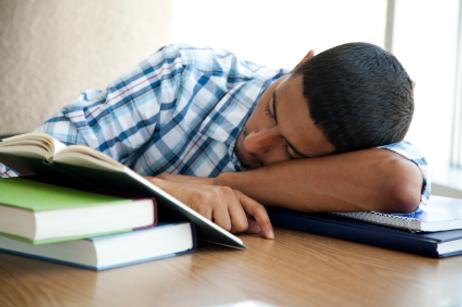Despite protests from parents and teachers, many students adopt and embrace habits of insomnia during their essential school years. Especially in the middle and high school years, many young teens receive far less than the recommended average amount of sleep.
The National Sleep Foundation (NSF) suggests that all people—both teens and adults—should receive at least seven to eight hours of sleep each night. Despite this recommendation, however, studies show that most students receive less than 6.5 hours of sleep each night. According to experts, the amount of sleep a student receives during his or her school years ultimately influences the outcome of each student’s academic performance.
The Significance of Sleep
As reported by BC Heights, a 2007 study of sleeplessness revealed that a lack of sleep leads to an array of health problems. Specifically, a lack of sleep actually drops the number of white blood cells in the body. With a loss of white blood cells, the body’s immune system is also taxed and less powerful. In a 2007 study, as experts examined the influence of sleep in rats, scientists discovered that after significant and consistent sleep loss, the rats’ immune systems eventually completely failed.
While sleep helps restore our immune systems and bodies, the role of sleep in one’s academic abilities is a bit more unique. As the National Institute of Neurological Disorders and Stroke (NINDS) supports, sleep is not only necessary for survival, but for brain development and optimal mental processing as well.
Exploring the influence of sleep on the brain, NINDS asserts that a lack of sleep leads to an inability to concentrate, impaired memory and physical performance abilities, and a reduced ability to carry out math calculations. Heightening these issues, if sleep deprivation patterns continue, hallucinations and drastic mood swings may also begin to develop.
The brain’s impairment due to lack of sleep can be caused by an array of physical responses. As NINDS explains, “Some experts believe sleep gives neurons used while we are awake a chance to shut down and repair themselves. Without sleep, neurons may become so depleted in energy or so polluted with byproducts of normal cellular activities that they begin to malfunction.” Without an opportunity to rest and regenerate, our brain gradually loses its ability to function at an optimal level.
Adding to this, sleep may even stimulate various neurological connections that would otherwise deteriorate; therefore, sleep can help restore cells and memory and may even prevent potential brain damage from developing.
Finally, in adding even more significance to the influence of sleep, further studies also reveal that a lack of sleep can lead to a reduced breakdown of proteins in the body. Considering that proteins are essential for cellular growth and cellular repair, lack of sleep can severely impede a child’s essential growth processes.
This video discusses sleep and teens.
The Link between Sleep and Student Performance
As an array of studies and trials reveal, a consistent intake of sleep and rest allows the body and brain to repair themselves, grow, and make imperative connections. In fact, these connections can be used to reinforce learning. According to NINDS, nerve-signaling patterns that occur during the day, while people are awake, can be mirrored and repeated during sleep. Due to various studies, experts believe that nerve-signaling repetitions can help encode data, information, and memories – all while powerfully improving learning.
In addition, there is a direct link between sleep and a student’s academic performance. According to the American Sleep Association’s 2008 report, people experienced a “decrease in cognitive function when subjects got less than eight hours of sleep.” Overall, students who perform at higher levels in school with greater academic success share a common habit; they adopt regular sleep habits to allow their brains time to rest and grow.
This video explains why sleep is crucial for academic success.
How to Encourage Your Children to Sleep
To guide students towards accepting more appropriate and healthy sleep patterns, parents can help foster more positive sleep habits.
One of the easiest ways to induce and encourage a student to go to sleep at an early time involves turning off any bright screens or bright overhead lights in the house as an intended bedtime approaches. Bright screens from video games or televisions stimulate a hormonal response for our bodies to stay awake, and subsequently, the illuminated entertainment mediums are actually tricking our bodies into avoiding feelings of sleepiness. Students can overcome this reaction by adhering to a program of regular sleep and wake-up time, paired with minimal electronic distractions in the evening.
Adding to this, students consuming a healthy diet with minimal caffeine and plenty of water also are able to generally adopt more positive sleep habits.
Questions? Contact us on Facebook. @publicschoolreview















